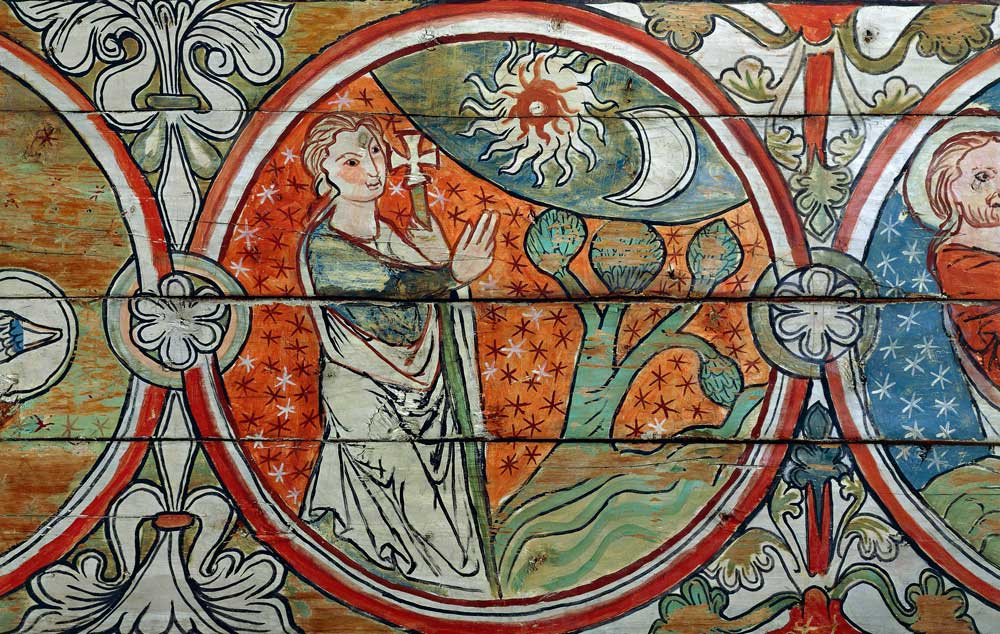The Birth of Time | History Today - 4 minutes read

‘Though all the months are adorned with various kinds of joy and honour, March is the most so.’ That was the opinion of an 11th-century English expert on the calculation of time, Byrhtferth of Ramsey, and many medieval scholars would have agreed with his view. What makes March a superlative month? The answer to that question lies in one of the most complex and perplexing areas of medieval attitudes to time and history – one very foreign from a modern scientific perspective, but carefully reasoned, coherent on its own terms, and intriguing.
What ‘adorns’ months, in the language of medieval calendar scholars like Byrhtferth, is anniversaries and significant dates – festivals and commemorations which elevate particular days in the year to the status of sacred time. (I like the idea of months being ‘adorned’ by their festivals, as if they were a Christmas tree, decked with baubles and tinsel.) March was special because, according to one tradition, a sequence of apparently ordinary days in late March marked the most important anniversaries in the history of the world.
This sequence hinges on 21 March, the date of the spring equinox, and 25 March, which in late antique and early medieval tradition was widely considered to be the historical date of the Crucifixion. That date was worked out from the information given about Christ’s death in the Gospels, most importantly its link to Passover: since Christ died at Passover, it was possible to try to establish the date of his death and work out what its equivalent might be in the Julian calendar. Though the moveable date on which the Crucifixion and Resurrection should be commemorated by the Church was a separate issue, it was deemed important to identify these as historical events which took place on specific days of the month.
In the Christian calendar Christ’s conception, commemorated by the feast of the Annunciation to the Virgin Mary, was also fixed to 25 March, because it was thought appropriate that he should have entered the world on the same date that he died: his life formed a perfect circle, with 25 March both the first and last day of his earthly existence. Calendar scholars reasoned that it was fitting to link to this crucial date other key events in biblical history, and one of these was the beginning of time itself. That special date, 25 March, was pinpointed as the last of the days of creation, the eighth day, on which God rested after completing his work – the end of another significant circle, the world’s first week.
If the eighth day was 25 March, it was possible to count back and identify the date on which each day of creation fell, starting with 18 March. So 18 March was the first day of creation, when God separated light from darkness; on 19 March, he created the sky; on 20 March, trees and plants first sprouted from the earth. On 21 March, the date of the equinox, the sun and moon were created, and that was the beginning of time. After all, you couldn’t measure time before the sun and moon existed to create cycles of days and nights, months and years, solstices and equinoxes.
Though there were alternative systems for calculating these dates, this one was popular. Early medieval calendars sometimes mark the dates with notes such as ‘18 March: first day of the world’, just another day among the list of saints’ feasts and commemorations. This way of thinking about the world around us – especially pinning the birth of time to a specific day of the month – can seem somewhat alien to a modern mindset, but the reasoning behind it makes sense according to the priorities of medieval Christian scholars. It is born of a conviction that the structures of nature were planned with care, designed by a divine Creator, and that they could be understood through the exercise of human reason. From that point of view it is both logical and beautiful, tracing loving intention in the circling months and the patterns of the days.
Trying to get your head around such radically different ways of understanding the world is one of the most challenging and fascinating aspects of studying pre-modern cultures. If nothing else, it gives you new dates to mark, interesting details to adorn your own experience of the passage of time. Nothing else to celebrate in the last weeks of March? Why not celebrate the birthday of the world.
Eleanor Parker is Lecturer in Medieval English Literature at Brasenose College, Oxford and the author of Conquered: The Last Children of Anglo-Saxon England (Bloomsbury, 2022).
Source: History Today Feed